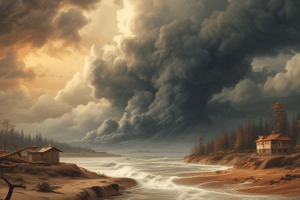Podcast
Questions and Answers
Which natural disaster is characterized by a large volume of water covering normally dry land?
Which natural disaster is characterized by a large volume of water covering normally dry land?
- Blizzard
- Earthquake
- Tsunami
- Flood (correct)
What type of natural disaster is often detected by seismographs?
What type of natural disaster is often detected by seismographs?
- Flood
- Earthquake (correct)
- Tornado
- Hurricane
Which of these natural events is most associated with underwater disturbances?
Which of these natural events is most associated with underwater disturbances?
- Blizzard
- Tornado
- Tsunami (correct)
- Thunderstorm
Which of the following describes a severe weather condition with rotating winds that forms over warm ocean waters?
Which of the following describes a severe weather condition with rotating winds that forms over warm ocean waters?
Which weather phenomenon is characterized by a rotating column of air touching the ground?
Which weather phenomenon is characterized by a rotating column of air touching the ground?
What weather event is characterized by heavy snowfall and strong winds?
What weather event is characterized by heavy snowfall and strong winds?
Which weather condition involves both lightning and thunder?
Which weather condition involves both lightning and thunder?
After a natural disaster occurs, which professional is primarily responsible for saving lives and assisting those in danger?
After a natural disaster occurs, which professional is primarily responsible for saving lives and assisting those in danger?
In the context of a disaster, who is directly affected and suffers harm or loss?
In the context of a disaster, who is directly affected and suffers harm or loss?
What infrastructure component is most likely to be damaged by strong winds or falling trees during a storm, potentially causing power outages?
What infrastructure component is most likely to be damaged by strong winds or falling trees during a storm, potentially causing power outages?
Which term describes the act of a building or structure falling down or breaking apart suddenly, often due to damage or instability?
Which term describes the act of a building or structure falling down or breaking apart suddenly, often due to damage or instability?
Which term refers to the strength or energy exerted, especially in a natural context?
Which term refers to the strength or energy exerted, especially in a natural context?
What is the name of the cloud-like structure associated with tornadoes?
What is the name of the cloud-like structure associated with tornadoes?
Consider a map laid flat on a table. Which adverb describes movement from left to right or right to left across the map?
Consider a map laid flat on a table. Which adverb describes movement from left to right or right to left across the map?
A tall flagpole is erected on flat ground. In what direction does the pole extend?
A tall flagpole is erected on flat ground. In what direction does the pole extend?
What type of disaster is a flood most similar to in terms of immediate impact?
What type of disaster is a flood most similar to in terms of immediate impact?
Which of the following is the most crucial action for rescue workers immediately following an earthquake?
Which of the following is the most crucial action for rescue workers immediately following an earthquake?
Why might a community choose to build storm shelters?
Why might a community choose to build storm shelters?
During a flood, why is it important to secure or move supplies to higher ground?
During a flood, why is it important to secure or move supplies to higher ground?
Which of the following is the most important reason to have a first-aid kit readily available during and after a natural disaster?
Which of the following is the most important reason to have a first-aid kit readily available during and after a natural disaster?
Flashcards
What is a flood?
What is a flood?
A natural disaster involving an overflow of water onto normally dry land.
What is an earthquake?
What is an earthquake?
A sudden and violent shaking of the ground, caused by movements within the Earth's crust or volcanic action.
What is a tsunami?
What is a tsunami?
A long high sea wave caused by an earthquake, submarine landslide, or other disturbance.
What is a hurricane?
What is a hurricane?
Signup and view all the flashcards
What is a tornado?
What is a tornado?
Signup and view all the flashcards
What is a blizzard?
What is a blizzard?
Signup and view all the flashcards
What is a thunderstorm?
What is a thunderstorm?
Signup and view all the flashcards
Who is a rescue worker?
Who is a rescue worker?
Signup and view all the flashcards
Who is a victim?
Who is a victim?
Signup and view all the flashcards
What are power lines?
What are power lines?
Signup and view all the flashcards
What does collapse mean?
What does collapse mean?
Signup and view all the flashcards
What is force?
What is force?
Signup and view all the flashcards
What is a funnel?
What is a funnel?
Signup and view all the flashcards
What does horizontally mean?
What does horizontally mean?
Signup and view all the flashcards
What does vertically mean?
What does vertically mean?
Signup and view all the flashcards
What is a storm shelter?
What is a storm shelter?
Signup and view all the flashcards
What are supplies?
What are supplies?
Signup and view all the flashcards
What is bottled water?
What is bottled water?
Signup and view all the flashcards
What is canned food?
What is canned food?
Signup and view all the flashcards
What does inland mean?
What does inland mean?
Signup and view all the flashcards
Study Notes
Unit 15 Vocabulary: Forces of Nature
- Flood (n.): A large amount of water covering an area that is usually dry.
- Earthquake (n.): A sudden and violent shaking of the ground, caused by movements within the Earth's crust.
- Tsunami (n.): A long high sea wave caused by an earthquake, submarine landslide, or other disturbance.
- Hurricane (n.): A severe tropical cyclone with a violent wind.
- Tornado (n.): A mobile, destructive vortex of violent winds.
- Blizzard (n.): A severe snowstorm with high winds and low visibility.
- Thunderstorm (n.): A storm with thunder and lightning and typically also heavy rain or hail.
- Rescue worker (n.): A person who saves people from dangerous or difficult situations.
- Victim (n.): A person who has suffered harm or loss.
- Power lines (n.): Cables used to transmit electricity.
- Collapse (v.): (of a structure) fall down or give way.
- Force (n.): Strength or energy as an attribute of physical action or movement.
- Funnel (n.): A tube or pipe that is wide at the top and narrow at the bottom, used for guiding liquid or powder into a small opening.
- Horizontally (adv.): In a horizontal direction or position.
- Vertically (adv.): In a vertical direction or position.
Unit 16 Vocabulary: Staying Calm Before the Storm
- Emergency (n.): A serious, unexpected, and often dangerous situation requiring immediate action.
- Storm shelter (n.): A structure designed to protect people from severe weather.
- First-aid kit (n.): A collection of supplies for treating injuries or illnesses.
- Cash (n.): Money in the form of coins or banknotes.
- Storm shutters (n.): Solid window coverings used to protect against storms.
- Sleeping bag (n.): A warm, padded bag for sleeping outdoors or in a tent.
- Flashlight (n.): A small portable electric light.
- Batteries (n.): A container consisting of one or more cells, in which chemical energy is converted into electricity and used as a source of power.
- Supplies (n.): Necessary items such as food, clothing, and equipment.
- Bottled water (n.): Drinking water packaged in plastic or glass bottles.
- Canned food (n.): Food preserved in cans.
- Inland (adj.): Away from the coast; toward or in the interior of a country or region.
- Destroyed (v.): Damaged or ruined beyond repair.
- Trunk (n.): The main wooden stem of a tree.
- Landfall (n.): The event of a storm reaching land.
Compound Nouns
- Compound nouns are made from a noun or a verb.
- The stress is usually on the first word when saying compound nouns.
Examples of Compound Nouns
- Snowfall: The snow that falls on one occasion, or the amount of snow that falls in a place
- Haircut: When someone cuts your hair/ the way that your hair is cut.
- Teamwork: The ability of people to work together.
- Raindrop: One drop of rain.
- Landslide: A sudden fall of earth, rocks, etc., down the side of a mountain.
- Bodyguard: A person whose job is to keep an important person safe.
Studying That Suits You
Use AI to generate personalized quizzes and flashcards to suit your learning preferences.




